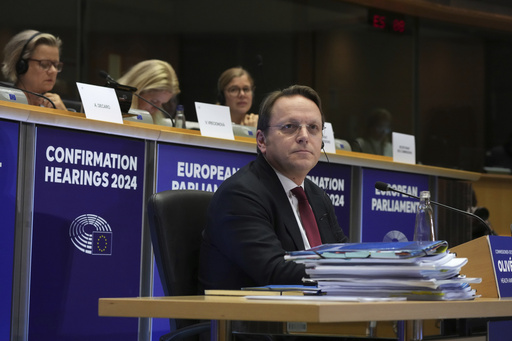
Brussels — After a week filled with discussions and debates, European Union legislators have officially approved a new group of policy commissioners that will lead one of the most conservative executive branches in the EU’s recent history for the next five years.
The principal centrist pro-European factions within the European Parliament have set aside their differences to finalize the distribution of key positions, stating their determination to collaborate on strengthening the European Union.
Since November 4, key lawmakers have been assessing the qualifications of the 26 nominees for the European Commission. These individuals will be responsible for significant policy areas such as trade, agriculture, and foreign affairs, all under the leadership of President Ursula von der Leyen.
The European Commission stands out as the sole body within the EU that has the power to propose new laws. Once these laws are approved by the European Parliament and the 27 EU member states, they are enforced throughout much of Europe, affecting various sectors ranging from water quality and data protection to migration and competition policy.
This approval sets the stage for an upcoming official vote where all EU lawmakers will cast their ballots on the full commission at a plenary meeting in Strasbourg, France, next week, which is expected to be a mere formality. Consequently, von der Leyen’s new team could begin its duties as soon as December 1.
EU-wide elections held in June resulted in a decline for many centrist and pro-European parties, while right-wing parties solidified their positions. Nevertheless, the European People’s Party (EPP), a major coalition of conservative parties across Europe, continued to hold the largest representation in the assembly.
This has allowed the EPP, of which von der Leyen is a member, to function without its usual centrist allies, including the center-left Socialists and Democrats, the market-oriented Renew group, and the eco-conscious Greens.
Over half of the newly appointed commissioners come from the EPP, giving conservatives ample opportunity to curate alliances for negotiating deals, with only four commissioners representing left-leaning parties.
In a departure from the norm, the EPP allied with far-right groups, such as the Brothers of Italy led by Italy’s Premier Giorgia Meloni, known for its neo-fascist past, and Hungary’s Prime Minister Viktor Orbán’s nationalist party, Fidesz, to expedite the hearing process for the new commissioners.
Nonetheless, the EPP, Socialists, and liberals, which form a parliamentary majority, emphasized that the solutions to Europe’s challenges “will emerge from the collaboration of our political factions and those committed to advancing a Union grounded in these values and prepared to tackle global issues while safeguarding democratic institutions.”
Notably, a historic first comes as Meloni’s appointee, Raffaele Fitto, has secured the position of executive vice president overseeing cohesion policies, which distribute substantial EU funds for infrastructure development.
Meanwhile, Orbán’s designated representative, Olivér Várhelyi, currently serving as the enlargement commissioner, was assigned the health and animal welfare responsibility, although his capacity regarding sexual and reproductive health rights is set to diminish as it will be reassigned to another commissioner.
The liberal members expressed approval over this adjustment, posting on social media that “with a modified role for Várhelyi, Fidesz’s sway over women’s rights is significantly reduced.” Hungary has faced increasing criticism in Europe for its regression on various rights, including those related to marriage and gender.
Last week, the Socialists criticized the EPP for its “irresponsible behavior” in collaborating with the Spanish populist party Vox. They claimed that Vox was improperly charging Teresa Ribera, its nominee for the key climate and competition position, with negligence concerning the devastating floods devastated eastern Spain. Nevertheless, she was also confirmed in her role.
